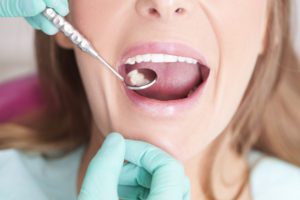Do your gums bleed constantly? Do they cause you tooth pain and other dental issues? Doctors estimate that 75% of American adults have some form of gum disease. Gum disease is a serious issue because it has strong links to other medical issues like heart disease and diabetes. Healthy gums provide the foundation for healthy teeth.
Dr. Chambers believes preventing gum disease is an important part of restorative dental care in her Lexington, KY dental office. She makes it a point to visually check for gum disease during every dental appointment. If she finds signs of this silent disease, she’ll recommend treatments and give at-home steps to alleviate the symptoms. Continue reading to learn more about gum disease and how we can help you address bleeding gums at Complete Dentistry For All Ages.

What is Gum Disease?
Gum disease is a common condition that affects many adults. It manifests in the form of bleeding gums, swollen or tender gums, receding gums and bad breath. The good news is that gum disease is entirely preventable. You can take steps to keep your teeth and gums healthy by brushing twice a day, flossing once a day, limiting sugary drinks and maintaining proper nutrition.
Periodontal disease is a common oral health issue and the next stage of gum disease. It happens when plaque buildup on your teeth is left unchecked. Plaque and bacteria eat away at your teeth and gums causing an infection in the area that holds your teeth in place.
Bad oral habits contribute to the development of this preventable disease. Brushing and flossing regularly and visiting the dentist at least two times a year will certainly prevent periodontal disease.
Common signs of gum disease include:
- Red, swollen or sore gums
- Bleeding gums
- Receding gums
- Loose teeth
- Mouth sores or pus between gums and teeth
- Bad breath (halitosis)
- Changes in the fit of dentures
Periodontal Therapy from Dr. Morgan Chambers
Dr. Chambers provides periodontal therapy to treat the stages of gum disease. She and her team will recommend appropriate gum disease treatment after a thorough exam. Treatment will vary from individual to individual, and will depend on the stage of gum disease present.
If you have early signs of gum disease, or gingivitis, she may recommend more frequent dental cleanings to restore your gums to the best health. If you need more intensive treatment, Dr. Chambers may recommend a deep cleaning, or scaling and root planing.
During this procedure, the hygienist will remove plaque and tartar from the deep pockets of your gums. Modern dentistry allows us to provide pain-free periodontal therapy treatments upon request. Patients who have advanced signs of gum disease may need more intense treatment like oral surgery and gum grafts. In these cases, Dr. Chambers may help coordinate treatment with a local periodontist.

Gum Disease FAQs
Do you want to know more about gum disease treatment in Lexington, KY? Learn more below.
What if I don’t get my bleeding gums fixed?
Since bleeding gums is a sign of periodontal disease, you open up yourself to more risk of getting infections, oral cancer, and losing teeth. Sometimes your gums bleed because you brush your teeth too hard, but it’s not always the case. Visit Dr. Chambers to find the exact cause of your bleeding gums.
Will gum disease go away on its own?
No. A disease will keep eating away at its host. Gum disease is no different. Gum disease is a chronic condition that won’t improve without treatment. If you have constant infections and a place for harmful bacteria to thrive, your issue won’t go away on its own.
The only way to get rid of it is to see a dentist and have them do what they can to treat it. They may recommend scaling and root planing or deep cleaning the teeth and removing tartar from the teeth with a dental scaler or ultrasonic device.
How can I prevent gum disease from coming back?
You can do multiple things to reduce the risk of gum disease from returning:
- Brush and Floss: Thoroughly brushing and flossing your teeth will remove leftover food and harmful bacteria that contribute to gum disease. Remember to floss before you brush. Flossing helps remove food between teeth and the gum line.
- Visit the Dentist: We recommend that you visit our dental office every six months. At routine visits, we provide a thorough cleaning that removes bad bacteria from the mouth. We can also find signs of problems like gum disease early to prevent it from worsening.
- Quit Smoking: Smoking weakens the immune system, which makes it harder for your body to fight infections like gum disease. When you stop smoking, your gums can heal better, and treatments for gum disease become more effective. Plus, quitting smoking improves blood flow to your gums, which helps them recover faster and reduces the risk of further damage.
Is periodontal therapy covered by dental insurance?
 Some dental insurance plans can cover part or all of your periodontal treatments. Since periodontal therapy is necessary to maintain oral health, it shouldn’t be an elective procedure. You must contact your specific insurance provider to make sure they’ll cover the costs. We’re also more than happy to confirm on your behalf.
Some dental insurance plans can cover part or all of your periodontal treatments. Since periodontal therapy is necessary to maintain oral health, it shouldn’t be an elective procedure. You must contact your specific insurance provider to make sure they’ll cover the costs. We’re also more than happy to confirm on your behalf.
Is gum disease linked to other health problems?
Yes, gum disease is most commonly linked to heart problems and diabetes. The bacteria from gum disease can enter the bloodstream and contribute to heart problems like clogged arteries and heart attacks.
Gum disease can also make it harder to control blood sugar. As a result, people with diabetes are more likely to develop gum disease. If you already have heart issues or diabetes, you have to be extra careful with your dental health.
Why do I have sensitive gums when I’m pregnant?
When you’re pregnant, your body goes through a lot of changes, including changes in your hormones. These hormones can make your gums more sensitive to plaque, which is the sticky stuff that builds up on your teeth.
This sensitivity can cause your gums to become swollen, sore, or bleed more easily. This is known as “pregnancy gingivitis,” and it’s pretty common. Taking good care of your teeth and gums by brushing, flossing, and visiting Dr. Chambers can keep your gums healthy during pregnancy.
Does periodontal therapy hurt?
No. You can think of periodontal therapy like a dental massage for your gums and teeth. You shouldn’t feel pain during treatment. Dr. Chambers will numb your mouth using a local anesthetic so that you don’t feel any discomfort.
How much does it cost to treat gum disease?
The cost to treat gum disease can vary depending on the severity. For early-stage gum disease, called gingivitis, you might only need a professional cleaning, which is t.
If the gum disease has progressed to a more serious stage, called periodontitis, treatment like deep cleaning (scaling and root planing) can cost more. Sometimes, surgery is needed, which can be even more expensive. Your dental insurance may cover part of the cost, so checking with your provider is a good idea.
Get Treated for Gum Disease Today
If you think you may have gum disease but aren’t sure, visit our office for diagnosis and treatment. Never assume a diagnosis without seeing a medical professional first. Call our dental care office at 859-251-3809 today. Our team at Complete Dentistry For All Ages is ready to help you fight gum disease and restore your oral health.
